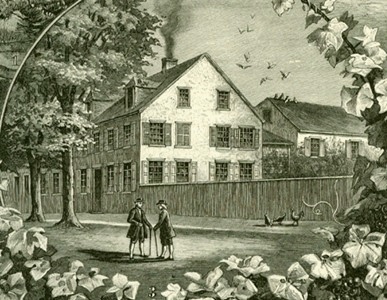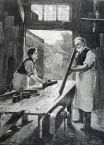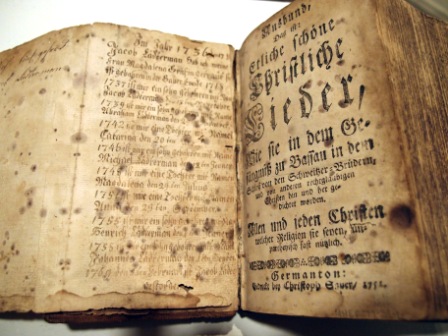Glimpses of “Skippack” Mennonite Life, 1745-1760
Written by Forrest Moyer on January 11, 2017

Christopher Sower’s printing house, Germantown, Pa.
As announced, one feature of this blog will be the republishing of articles from past issues of the MHEP Newsletter and Quarterly. One of the first significant articles published in the Newsletter, when it began in 1975, was a translation by John Ruth of Mennonite-related material published in Christopher Sower’s German newspaper, 1745-1760. We present it here again for your enjoyment and education. Editor’s notes are original to the Ruth article.
Christopher Sower‘s newspaper, Pensylvanische Berichte or (later) Nachrichten, begun in Germantown in 1739, reported on local events throughout the German settlements of Pennsylvania. A section near the end of each issue was made up of what we might call “classified ads” or even “personals”. I have excerpted for readers of our Newsletter a number of those “notices” which have Mennonite relevance. Some are exact translations and some are paraphrases or summaries. –John L. Ruth, Vice President, MHEP
Wandering cattle
1745, November 16: Henry Ruth, resident of Skippack in Lower Salford Township, advertises that four cattle have wandered off for him. Two are steers–each two years old; the one is red with a star on its forehead, the other is black. The one heifer is brindle, large, and is three years old, with a white spot on its head, and it has a three-shilling bell on, which is stamped “HR”. The other heifer is black with a white head. Whoever finds them and brings them to him will receive fifteen shillings, or more, accordingly, if they have wandered far. [Ed. note: Henry Ruth
was the pioneer of his clan, and owned the plantation on which the Salford Meetinghouse was built.]

Henry Ruth’s signature (and the mark of wife Magdalena) on the 1739 deed donating land for the Salford meetinghouse.
1749, February 16: During the past Fall someone lost a pocket-book in Germantown with a considerable sum of money. There is also something written in it in which John Landes and Bastian Benner are mentioned. Whoever can identify it and the money and how much it is may apply at the printer of this paper.
1749, February 16: On the 22nd of March at public auction the plantation in Skippack of the deceased John Lederach will be sold. There is 150 acres of good land; it has a new stone house, a good barn and stables; approximately twenty acres of meadow, and more could be made; in all there are 100 acres cleared, and it has around it a living hedge, and also some intermediate fences. Fifty acres still have good timber. At the same time will be sold all kinds of household articles, cows, horses, sheep, and swine. The auction will begin at nine a.m. John Lederach, Jr. and Jacob Groff.
1749, December 1: Henry Landes in Perkasie [Ed. note: Blooming Glen] makes it known that during the previous year a single man from Heppenheim near Alzey [in the Palatinate] has immigrated. His name is Jacob Haart. His brother-in-law-Henry Landes desires to know where he is. He is to inform either him or the printer at Germantown.
A robbery on the Germantown Road
 1749, August 25: On [Friday] evening after eight o’clock Jacob Souder and Martin Funk, residents of the Perkasie area, were riding on horseback with a servant between Germantown and Philadelphia in the vicinity of Nageli’s plantation, with the intention of carrying what they had to market. A couple of Irishmen came to them and rode along with them for awhile, and had two pistols with them. They put the pistols to Martin Funk and Jacob Souder’s breast and said they should give up their money, and at the same time grabbed at their wallets. The men were terrified, and gave up what they had. Then they released them. Also, Mr. Green came along with a chaise toward Philadelphia [and they robbed him too]. However, when the highway-robbers went by Mr. Green’s house in Philadelphia the boy who had been in the chaise recognized them, and so an alarm was raised on the street, that the thieves should be caught. They were seized, and brought to Justice Mr. Allen. Martin Funk and his servant with Jacob Souder were also brought there, where the robbers already were, and were required to testify that these were the actual people. What they had taken was all found with them. One of their pistols was loaded with twenty-five pellets, and the other had even more. They were put into jail prior to the [meeting of] the Supreme Court. [Editor’s note: From other sources we learn that the two men, “Fielding and Johnson”, after an unsuccessful attempt at breaking out of the jail, were executed.]
1749, August 25: On [Friday] evening after eight o’clock Jacob Souder and Martin Funk, residents of the Perkasie area, were riding on horseback with a servant between Germantown and Philadelphia in the vicinity of Nageli’s plantation, with the intention of carrying what they had to market. A couple of Irishmen came to them and rode along with them for awhile, and had two pistols with them. They put the pistols to Martin Funk and Jacob Souder’s breast and said they should give up their money, and at the same time grabbed at their wallets. The men were terrified, and gave up what they had. Then they released them. Also, Mr. Green came along with a chaise toward Philadelphia [and they robbed him too]. However, when the highway-robbers went by Mr. Green’s house in Philadelphia the boy who had been in the chaise recognized them, and so an alarm was raised on the street, that the thieves should be caught. They were seized, and brought to Justice Mr. Allen. Martin Funk and his servant with Jacob Souder were also brought there, where the robbers already were, and were required to testify that these were the actual people. What they had taken was all found with them. One of their pistols was loaded with twenty-five pellets, and the other had even more. They were put into jail prior to the [meeting of] the Supreme Court. [Editor’s note: From other sources we learn that the two men, “Fielding and Johnson”, after an unsuccessful attempt at breaking out of the jail, were executed.]
1749, November 1: Christian Fretz on the Deep Run at Perkasie advertises that he has lost a three-year-old horse, branded C.F. Whoever brings him to the owner or to Henry Clemmer in Skippack shall have fifteen shillings.
1750, October 16: Henry Funk, resident of Perkasie, says he has lost a cow. Whoever brings it either to him or to Hupert Cassel or to Henry Funk, Sr. will have eight shillings.
1751, October 1: Johann Adam Dock, a tailor, moved away from Annweiler near Landau [in the Palatinate] ten years ago and came to this land. His sister Anna Margaretha with her second husband Jacob Werth came into this land two years ago, and have been unable, to this time, to learn anything of her brother Johann Adam Dock. If he is still living, or if anyone knows where he is, it is desired that notification be given either to the sister above-mentioned, at the Trappe, or to the printer of this paper.
1752, February 1: A letter for Abraham Landes of Perkasie, with two shillings postage due, is at the printer’s, along with many others for Pennsylvania Germans. [Apparently a recently arrived ship had brought mail from Europe.]
 1752, February 16: Johan Gottschalck in Skippack in Hatfield Township…has had an apprentice disappear, in the beginning of February. His name is Jacob Knausz, over sixteen years old, is bound to carpentry-work (zum Dreher-Handwerck gebunden). A ten shilling award is offered.
1752, February 16: Johan Gottschalck in Skippack in Hatfield Township…has had an apprentice disappear, in the beginning of February. His name is Jacob Knausz, over sixteen years old, is bound to carpentry-work (zum Dreher-Handwerck gebunden). A ten shilling award is offered.
a
Be warned: This land not for sale
1752, October 16: Andrew Ziegler in Skippack, administrator for Jacob Schnebele (who died at Manheim) advertises that whoever owes anything to the above-mentioned Jacob Schnebele shall come and pay. [In a later issue the following note is added:] And since there is in the hands of Jacob Hackman in Manheim a deed for 250 acres of land in Pennsylvania which had belonged to the deceased Jacob Schnebele, therefore Andrew Ziegler warns everyone, that no one should bother to buy this deed; he will only lose his money. No one may possess the land except the rightful inheritors. And since Andrew Ziegler as Administrator is required to pay the debts of the deceased, and since there is nothing in hand from which the debts may be paid, so it is necessary for him to sell the land through governmental authority without any deed. [Ed. note: Andrew Ziegler married the only daughter, Elizabeth, of preacher Dielman and Elizabeth Schnebele Kolb. At the time of this notice, Andrew is a bishop, living near Lederach, Pa.]
1753, May 16: Henry Rosenberger of Skippack in Franconia Township advertises that a German servant has left him. She is about twenty-four years old, tall, and her name is Maria Magdalena Werner. She took much and varied clothing along with her, so that her dress may not be described. She has lost most of her upper teeth, has black hair, and in general is a respectable-looking person. Whoever finds her and keeps her so that her master can have her again shall have thirty shillings… [Henry Rosenberger, deacon at Franconia, lived along the Indian Creek where Jonathan Godshall last farmed. The Franconia meetinghouse was built on his land.]
Bound Ausbunds available
1753, August 1: The Mennonites’ Songbooks may now be had well-bound in Lancaster at Henry Walter’s and at the printer of this, in calf-leather with good clasps for 6 shillings 6 pence, specially studded (wohlbeschlagen) for 9 shillings.

A copy of Sower’s 1751 edition of the Anabaptist hymnbook called the Ausbund, containing the family register of immigrants Jacob & Magdalena Graf Leatherman of Deep Run. Mennonite Heritage Center collection.
1753, August 1: John Landes in New Britain Township in Bucks County advertises that on the 6th day of August he will sell his plantation at public auction. It lies one mile from the Neshaminy, and a half-mile from Justice Butter. It has 121 acres of land, a good house and barn, and there are about 70 acres cleared…good neighborhood….
1753, September 26: [From a Lower Salford Township day book of Jacob Clemens): My Brother, John Clemens and I freed a carpenter from the ship and each of us paid one-half of his freight, and we must furnish him with clothing as long as he works for us. [Ed. note: Jacob Clemens lived on the farm adjacent to the Salford Mennonite Meetinghouse property.]
1754, July 24: Dielman Kolb, Jr. in the township of Perkiomen and Skippack advertises that on the 24th of July a black horse, branded in front on both sides with IBK wandered away….
1755, October 16: John Clemens in Salford Township, Philadelphia County, advertises that a brown cow with white spots has been with his cattle since the wheat harvest.
Mennonite charity
1756, January 16: The day before New Year the Mennonites of Skippack and those who live farther out sent seven wagons with meal and other provisions to Bethlehem and Nazareth for the poor people who have fled there on account of the Indians.
1756, May 16: Hans Uly Bergey in Lower Salford advertises that a black mare has been with his cattle since March. On the left front shoulder she is branded AR….

The datestone in Hans Ulrich Bergey’s Lower Salford Township farmhouse, 1732.
1756, November 27: Andrew Ziegler in Skippack advertises that his son has found a watch in the road between his house and Michael Ziegler’s. [Ed. note: M. Ziegler’s house was at the present-day intersection of Routes 113 and 73.] Whoever has lost it can give the correct description. He may have it by paying the cost of this notice.
1758, July 30: Philip Geissinger in Upper Saucon Township in Northampton County advertises that a man named Abraham Spitzenberger bound himself on July 24 for one year, and on July 30 went away to fetch his clothes. However, he has not returned. He left a horse which the said Geissinger bought from him. He does not know whether the man has died, or whether someone had stolen the horse, since the man does not return. The horse is fox-colored, has a short, yellowish tail and mane. If the man is living, he is to take up his service, or get the payment for his horse. However, if it is stolen, the owner is to come and identify the remaining marks [of the horse].
An unfaithful wife
1758, August 19: Jacob Clemens in Towamensing [Towamencin] Township advertises that his wife, Margaretha, for a considerable time already, has been untrue to him, and has now completely left him. He has reason from her to think that she will make debts for him. No one shall lend her anything on his account; he will not pay it.
 1759, October 12: Nicholas Jansen on the Skippack Road advertises that two grown sheep and two lambs, all unshorn, have been at his place since before harvest.
1759, October 12: Nicholas Jansen on the Skippack Road advertises that two grown sheep and two lambs, all unshorn, have been at his place since before harvest.
Thanks to John for the interesting excerpts he has shared with the readers of the Newsletter. We have had many favorable comments. –ELR [Ella L. Ruth, MHEP Newsletter editor, 1975]
